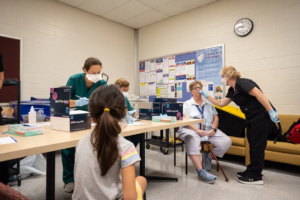Screening Older Doctors: Good Sense, or Discrimination?
9 min read
Irwin Nash was 73 years old when he filed a complaint with the United States Equal Employment Opportunity Commission against Yale New Haven Hospital, the primary teaching hospital affiliated with Yale School of Medicine. At the time of the 2018 filing, Nash had worked as a pathologist at the hospital or served on the medical school faculty for 42 continuous years. The EEOC, earlier this year, charged the health system with violating the law by requiring employees to complete cognitive and eye exams to maintain hospital privileges after age 70. Nash had passed the examinations, but the lawsuit alleges that the screening requirements subjected him and others “to the stigma of being singled out because of their age.”
Nearly 150,000 U.S. physicians age 65 or older are in active practice, accounting for 15 percent of the physician workforce, according to the American Medical Association. Yale is one of a number of hospitals and health systems that have implemented policies requiring physicians when they reach a certain age — typically 70, sometimes older — to undergo specialized screenings in order to continue medical practice. Aging is associated with declines in cognitive performance and other functions, and proponents of age-based screening programs say that the evaluations are needed to protect patient safety. But the policies are controversial. In addition to the EEOC complaint, at least one state legislature has voted to restrict age-based screenings of physicians. Meanwhile, some physicians argue that a test score may not adequately reflect one’s fitness to practice medicine.
Unheard of a decade ago, the age-based policies are emerging even though the U.S. needs a growing number of physicians. The country’s population is aging and older people need more health care; a shortage of at least 46,000 physicians is forecast by 2032. Older physicians not only contribute to the workforce, but positive attributes such as wisdom and resilience may actually increase as a function of aging, according to the American Medical Association. “We want to be careful not to unduly or unnecessarily move physicians out of the workforce if we can avoid it,” said Todd K. Rosengart, chair of the surgery department at Baylor College of Medicine.
Nonetheless, the Society of Surgical Chairs — comprised of the heads for 185 academic surgery departments — last year recommended mandatory testing of all surgeons by at least age 65. At the time, Rosengart and other surgeons who developed the recommendation thought they were committing “professional suicide.” But that isn’t how things turned out. “We were very pleasantly surprised,” he said. By and large, their colleagues supported the testing. In fact, many in the medical community, including several of the country’s most prominent health systems, have supported age-based screenings. And, yet, it remains to be seen whether they are effective — and whether such policies will stand up in court.
Since 2016, physicians, psychologists, and other members of the Yale New Haven Hospital medical staff age 70 and older have been required to complete neurocognitive and eye tests as a part of their reappointment process. (Most hospitals have bylaws requiring that, every few years, all members of the medical staff must seek reappointment to continue practicing at the hospital.)
The hospital’s medical executive committee initiated the screening policy because of “concerns about the potentially compromised ability of older clinicians,” according to an article in the Journal of the American Medical Association. The exams, designed to screen for cognitive decline commonly associated with aging, test a physician’s memory, hand-eye coordination, information-processing speed and accuracy, among other functions.
Between October 2016 and January 2019, 141 Yale clinicians, ranging in age from 69 to 92, completed the assessments. Of those, 18 — nearly 13 percent of those tested — demonstrated cognitive deficits “deemed likely to impair their ability to practice medicine independently.”
The link between a specific deficit and the ability to practice safely often depends on a physician’s specialty, said William Perry, a neuropsychologist and professor of psychiatry at the University of California San Diego School of Medicine. For example, a physician who has poor hand-eye coordination should not perform neurosurgery, he said, while a physician with a visual scanning problem may not be able to pick up on important details. “You don’t want that person to be a radiologist,” he said.
“While age alone doesn’t predict or solely identify either physical impairments or cognitive impairments, there really isn’t much argument that, as you get older, the frequency of such goes up,” said Donald Yealy, senior medical director of the health services division at the University of Pittsburgh Medical Center. He helped craft his system’s age-based screening policy, with discussion beginning in late 2013, motivated in part by concern that some complaints about physicians might have been avoided if those individuals had been proactively assessed for competency.
This same line of thinking prompted the University of California San Diego School of Medicine to develop its late-career health screening program, which conducts age-based screenings of physicians for other institutions on a contract basis. Those screenings are an outgrowth of a bigger program at the university, which performs competency assessments of physicians who have been referred by a state medical board or hospital administration after complaints about their performance.
After conducting more than 1,800 competency assessments, it became clear that certain risk factors — including health problems and cognitive decline — were associated with the physicians involved in disciplinary proceedings, said David Bazzo, a primary care physician who oversees the program. He and his colleagues thought screening proactively could prevent problems.
Late-career screenings are sometimes compared to age-based recommendations for colonoscopies; even if there is no evidence of a problem, it’s a good idea to check. “It is a screening test. It’s not meant to make any diagnoses. All it can say is whether there is concern enough on the performance that would warrant the full neuropsychological testing, which is diagnostic,” Bazzo said. To date, his health system has conducted about 100 such screenings of physicians age 70 or older; about 20 percent of those have been referred for more in-depth testing.
In 2011, the Coalition for Physician Enhancement, a professional organization for those interested in the science of evaluating physicians in active practice, convened geriatricians, administrative law judges, attorneys, and others to discuss aging physicians. In a survey of participants, the majority favored age-based screening of physicians beginning at the age of 70.
As a medical specialty, surgeons have been particularly active in pushing for age-based screening. In 2016, the American College of Surgeons recommended that, starting at age 65 to 70 years of age, surgeons undergo voluntary health and neurocognitive assessments and it encouraged physicians to disclose any concerning findings as part of their professional obligation. The next year, two surgeons and a bioethicist at the University of Washington recommended that health care institutions make such age-based tests mandatory. And in 2019, when Rosengart was its chairman, the Society of Surgical Chairs recommended mandatory cognitive and psychomotor testing of surgeons by at least age 65.
In 2015, the American Medical Association Council on Medical Education published a review of studies that have explored the link between physicians’ age and their cognitive and sensory abilities. Its report said aging is associated with decreased mental processing speed, increased difficulty ignoring irrelevant information, limited ability to complete complex tasks, decreased manual dexterity, and reduced ability to see and hear, among other things.
Does that mean older physicians have worse patient outcomes? On that question, the evidence is inconclusive. Studies have found higher mortality rates for cardiovascular procedures performed by older surgeons, for example, but higher mortality rates for gastrointestinal surgery performed by younger surgeons.
Further, a physician’s cognitive ability — regardless of age — may not accurately reflect his or her competence to practice, said Herbert Rakatansky, who chairs a committee overseeing the Rhode Island Medical Society physician health program. He recalls an older physician who was referred to the physician health program after reports of substandard clinical care and forgetfulness. “Cognitive testing did not reveal significant abnormalities,” Rakatansky wrote in the Rhode Island Medical Journal in 2017. “Thinking that this doctor may have had very high cognitive function previously and that the current test was part of a ‘downhill’ process, the cognitive testing was repeated two years later and it was marginally improved!”
The takeaway, Rakatansky said in an interview, is that the score on a cognitive test may not correspond to a physician’s fitness to practice. “The only real way to assess somebody’s competence is to observe their practice,” he said.
S. Andrew Josephson, chair of the neurology department at University of California San Francisco, agrees, pointing out that young clinicians can have cognitive decline that might limit their ability to practice safely, just the same as older ones. “If we set some arbitrary age cutoff for testing, we are not focusing on what the problem is, which is considering identifying physicians who have cognitive impairment from a variety of issues, whether it be a neurodegenerative process, substance abuse issues,” or something else, he said.
“It smacks of ageism,” Josephson added.
Proponents of age-based screening policies say they want to follow the lead of other safety-conscious industries that have age-mandated medical examinations. Commercial airline pilots, for example, must pass a medical test every six months after age 40, and air traffic controllers must retire at age 56. But those positions, along with a few other job categories, are effectively exempted from federal age-discrimination laws, said Laurie McCann, an age-discrimination attorney for the AARP Foundation. In those instances, federal statutes specifically allow for mandatory age-based screening.
McCann likens the EEOC’s lawsuit against Yale New Haven to a suit it filed against the Commonwealth of Massachusetts in the early 1990s, which required all state employees to undergo a physical examination at age 70 in order to keep their jobs. Although a district court sided with the state, an appellate court overturned that ruling. “That was exactly the type of arbitrary age discrimination that the federal age discrimination employment act was enacted to prohibit,” McCann said.
The EEOC has invoked two federal laws in its lawsuit against Yale New Haven: the Age Discrimination in Employment Act and the Americans with Disabilities Act. Both acts prohibit discrimination in employment. But in a May 13 response, Yale New Haven countered that neither act is relevant to this particular case because the physicians in question are not, strictly speaking, employed by Yale New Haven Hospital. Dr. Nash, for example, is an employee of the Yale School of Medicine with staff privileges at the hospital. Further, Yale New Haven asserts that the age-based screenings are “job-related and consistent with business necessity,” meaning they are allowed by the ADA.
Whether a verdict in the Yale New Haven case would apply to screening policies at other health systems is not clear. EEOC attorney Markus L. Penzel, wrote in an email that the EEOC plans to “look closely” at any policies explicitly related to age.
The EEOC is only the latest institution to question the propriety of such screening policies. Stanford’s late career practitioner policy, implemented in 2012, later eliminated mandatory cognitive screening after Stanford’s faculty senate gave the idea a thumbs-down.
In Utah, it was the state legislature, rather than regulators or faculty members, that stopped age-based testing of physicians. Beginning in 2014, Intermountain Health Care physicians working in the health system’s Salt Lake City region were required to have a medical exam and screenings for sensory and cognitive function to maintain their practice privileges. In 2018, State Sen. Lyle Hillyard sponsored a bill — later signed into law — to stop the practice; in testimony before a senate committee, he said it is arbitrary to say that at a certain age, “you have to take this test,” according to Deseret News.
Within the next decade, a third of currently active physicians will be 65 or older. Trusting that all physicians will recognize when they need to stop practicing — or protect patients from incompetent colleagues — is not a good idea, Rosengart argues. Physicians often do not recognize their own cognitive decline and their colleagues may not point it out. In fact, a national survey of physicians found that 45 percent of those who knew of impaired or incompetent colleagues did not report them to the appropriate authorities.
The potential threat to patient safety varies by medical specialty, Rosengart said. Some specialists could compensate for poor memory by looking up information they need; neurosurgeons, by contrast, must be able to react on the spot. “All specialties are going to be somewhat different, but I think, in general, the concept of blending careful clinical performance assessment with some other metrics like cognitive testing is good,” he said.
“Putting your head in the sand and pretending like this is not a potential issue,” he said, “is not a good approach.”
This article was originally published on Undark. Read the original article.







